Pay attention to 4 factors to ensure the baby’s normal brain development~
“Doctor, what can you eat during pregnancy to make your baby smarter?”
“Can eating folic acid make babies smarter? How about DHA?”
Every pregnant mother wants her child to be smart and beautiful. However, what factors will affect the baby’s brain development?
Professor Sun Lizhou from Jiangsu Provincial People’s Hospital once delivered a speech “Risk Factors Affecting Fetal Brain Development during Pregnancy”.
Explained in detail which factors will affect the IQ of the fetus, and even affect the development of the nervous system.
Do you know the period of fetal brain development? From a fertilized egg to a fetus, it undergoes cell proliferation and differentiation. From the B-ultrasound, the baby’s changes can also be observed. But, do you know when the baby’s brain development begins? In fact, at the 4th weekend of the embryo, the baby’s brain bubbles are formed; In the 5th to 6th week of the embryo, the forebrain vesicles form the left and right telomeres; By the 7th week of the embryo, cerebral cortex tissue has occurred; At the 8th week of the embryo, the cerebellum occurs; At the 12th week of the embryo, the cerebellar hemisphere and cerebellar vermis are formed; The weight of the brain at birth is about 25% of that of an adult, and by the age of 2 it increases to about 75% of that of an adult; At the age of 1 year, the DNA level of the brainstem reached the adult standard, and at the age of 4, the DNA level of the forebrain and cerebellum reached 75% of the adult. 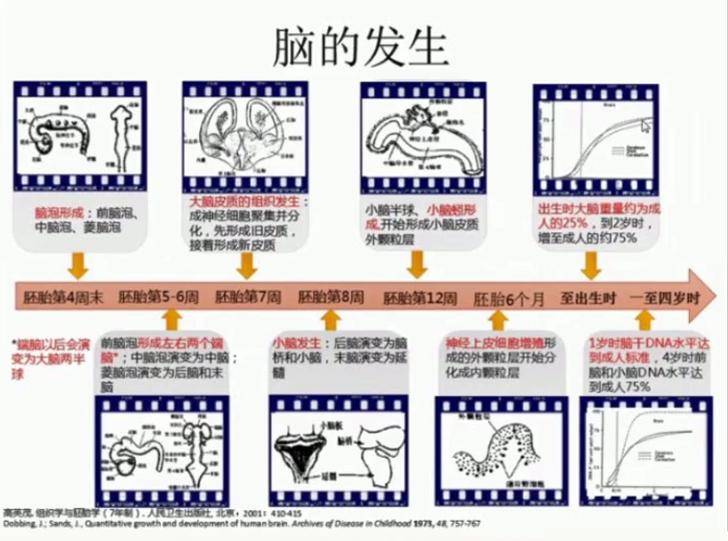 It can be seen from the figure that the neurodevelopment of the fetus begins in the first trimester and covers the entire fetal period until 3 years after birth. Moreover, the fetal period is an extremely important period for brain development.
It can be seen from the figure that the neurodevelopment of the fetus begins in the first trimester and covers the entire fetal period until 3 years after birth. Moreover, the fetal period is an extremely important period for brain development.
What factors affect fetal brain development? The baby communicates with his mother through the placenta in the womb. The outer layer of the placenta is mainly composed of maternal cells, and the inner layer is composed of fetal cells. The state of the mother will affect the state of the placenta, thereby affecting the development of the fetus.
1
Risk factor 1: weight gain during pregnancy
Too much or too little weight gain during pregnancy can cause adverse health problems for mothers and babies.
The mother may have postpartum weight retention, increase the risk of cesarean section, increase the risk of gestational diabetes and high blood pressure.
The effects on the fetus include: birth volume larger or smaller than gestational age, increased risk of premature birth and childhood obesity risk.
The American Institute of Medicine (IOM) has published a guideline recommendation for weight gain during pregnancy:
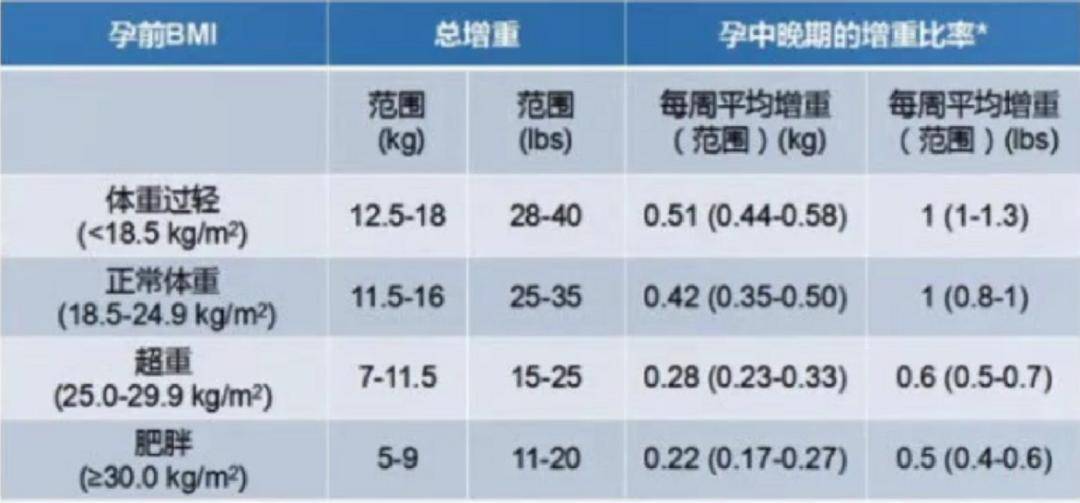
In addition, a review of 12 studies proved that obesity during pregnancy is related to the baby’s future cognitive, behavioral, and emotional development. And it will increase the risk of behavioral and cognitive deficits in childhood.
Therefore, the weight gain of pregnant mothers during pregnancy must be reasonable. Don’t just eat and drink just to make your baby grow up and grow stronger; don’t over-control your diet just to keep your body in shape.
2
Risk factor 2: Cesarean section
Caesarean section will also affect the baby’s brain development?
This is a conclusion based on the results of a large number of studies. Cesarean section not only affects the early stage of the baby, but also increases the baby’s risk of developing some diseases in the long term.

Studies have shown that cesarean section is related to autism spectrum disease. It is possible that the oxytocin injected during cesarean section will change the balance of oxytocin in the newborns, thereby affecting the brain development of children.
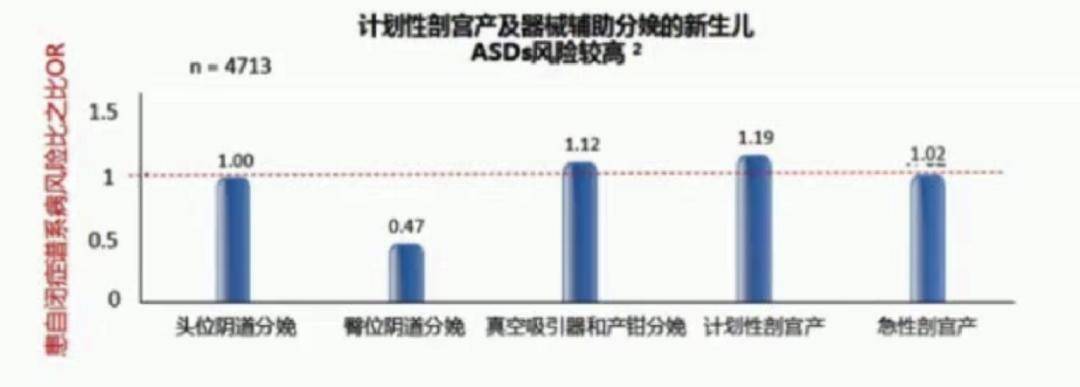
The picture shows the risk comparison of autism spectrum diseases (ASDs) in newborns with different delivery methods
In addition, due to the birth without the natural birth canal, the ability of the newborn to adapt to the external environment may be reduced after birth, and the early behavioral ability is slightly lower than that of the newborn born naturally. But this is transient, don’t worry too much.
There are also research results that show that cesarean section surgery may damage the intellectual structure of children. Babies born under cesarean section have lower IQs in terms of number breadth and memory/distraction factors than those born naturally.
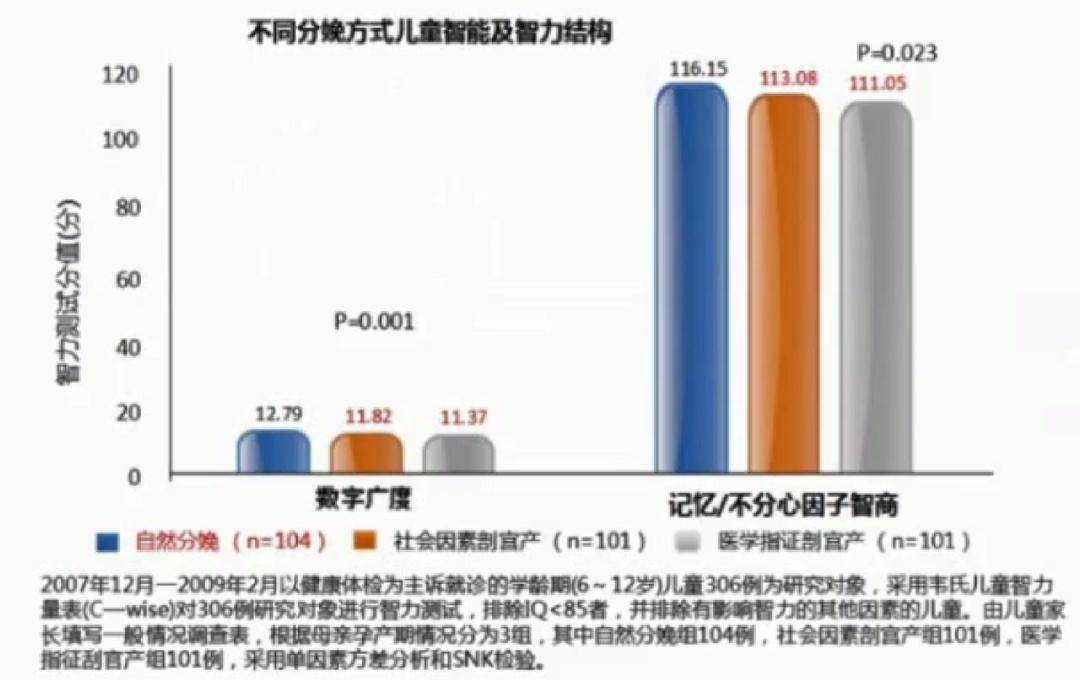
Therefore, if you can live by yourself or live by yourself!
However, when there are medical indications for cesarean section, it is still necessary to weigh the pros and cons and follow the doctor’s advice.
3
Risk factor 3: Complications during pregnancy
Complications during pregnancy include: gestational hypertension, gestational diabetes, intrauterine infection, and others, such as thyroid disease during pregnancy, abnormal psychological conditions during pregnancy.
Although most pregnancy and childbirth can go through smoothly, about 15% of pregnant women will have life-threatening complications during pregnancy. Not only will it threaten the life of the mother, but also affect the normal development of the fetus.
▎Pregnant hypertension:
Studies have shown that pregnancy-induced hypertension can increase the number of fetal brain neuronal apoptosis, cause neuronal damage, and affect the development of the nervous system.

The picture shows the comparison of brain nerve cells between normal fetuses and fetuses with perinatal asphyxia and preeclampsia
In addition, there are prospective follow-up studies that show that high blood pressure during pregnancy can cause about 30% of children to have IQ lower than normal at the age of 4.5.
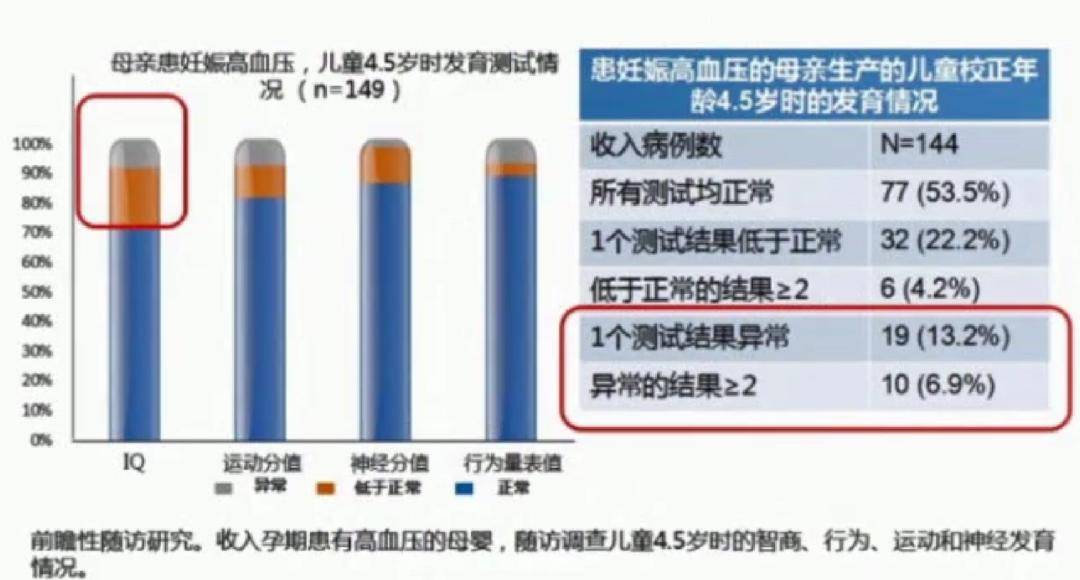
▎Gestational Diabetes:
Studies have shown that gestational diabetes can cause memory impairment in infants.
A baby born to a mother with gestational diabetes does not have a big difference between the face of the mother and the face of a stranger.
A baby born to a normal mother during pregnancy will attract more attention when seeing the mother’s face.
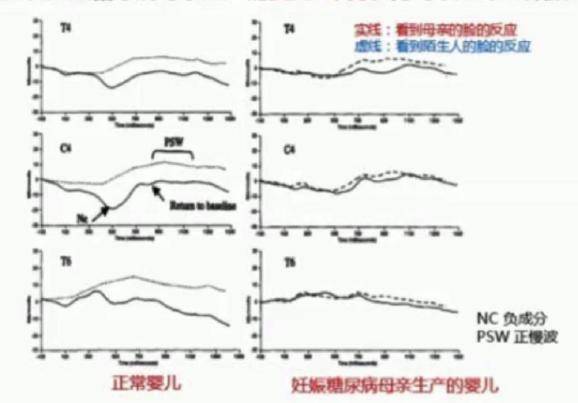
The picture shows the total average data of 6-month lateral leads for normal babies and babies born to gestational diabetic mothers. The infants in the control group showed larger negative components when facing their mothers or strangers, indicating that the mother’s face attracted more attention of the infants.
In addition, the control group infants had greater differences in memory renewal (PSW) to their mothers or strangers, but there was no significant difference in infants born to gestational diabetic mothers, indicating that memory and cognitive functions were impaired.
At the same time, about 50% of babies born to pregnant women with gestational diabetes will suffer from neonatal hypoglycemia. The longer the period of neonatal hypoglycemia, the greater the impact on brain development.
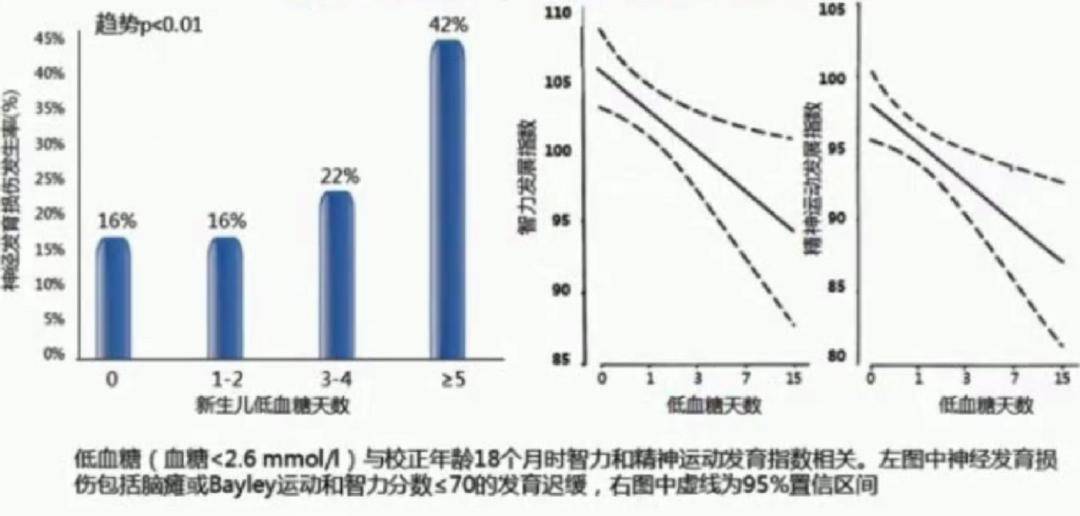
In addition, studies have shown that hypertension, diabetes, and other metabolic disorders during pregnancy are related to autism and growth retardation in the offspring.
▎Intrauterine infection:
Mothers infected with Toxoplasma gondii, rubella, cytomegalovirus (CMV), herpes simplex virus (HSV) and other microorganisms during pregnancy can cause mental retardation, cerebral palsy, enlarged ventricles and other brain and behavioral abnormalities in the offspring.
Studies have shown that intrauterine infection can cause the baby’s neurological disease and the risk of cerebral palsy to double.
Especially this year’s new crown epidemic, the long-term impact on the baby is still unclear, and further follow-up studies are needed.
▎Thyroid disease:
Thyroid function itself will affect the brain development of the fetus. Hypothyroidism and subclinical hypothyroidism during pregnancy need to be corrected in time.
It is best to perform a thyroid function test before pregnancy and follow-up screening during pregnancy.
A prospective birth cohort study showed that the mother suffered from hypothyroidism in the first trimester, and the IQ value of the children born during the school age decreased by 4.3.
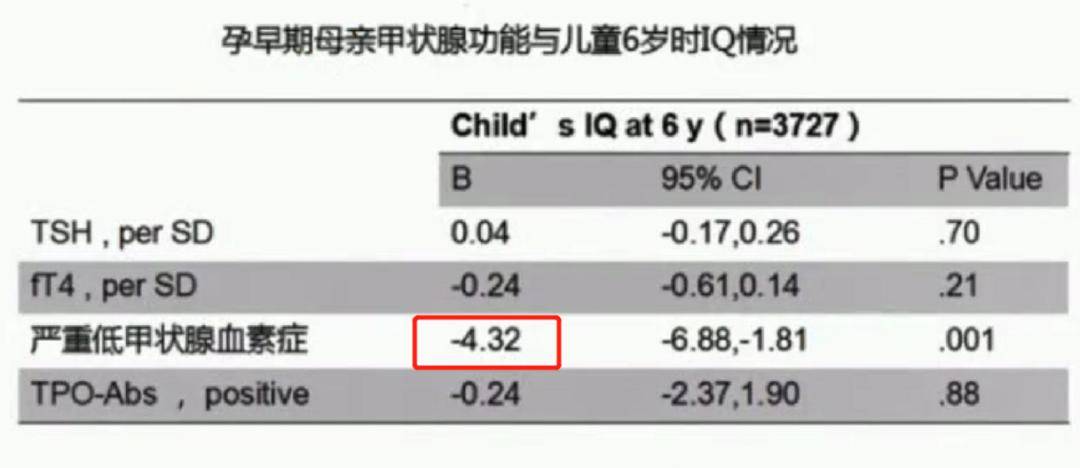
4
Risk factor 4: Intrauterine growth restriction (FGR)
Intrauterine growth restriction has a high incidence in developing countries and is a common adverse pregnancy outcome.
Some scholars compared the brains of children with FGR, full-term infants, and premature infants by MRI and found that:
Compared with full-term children, FGR children showed reductions in bilateral temporal lobes, hippocampus, amygdala, right central area, right frontal lobe, left parietal lobe, and basal ganglia.
Compared with preterm infants, children with FGR showed that the amygdala, basal ganglia, thalamus, insula, bilateral angular gyrus, left occipital and parietal lobes, and right central area were all reduced in volume.

The picture shows the MRI comparison of FGR infants, term infants and premature infants
All in all, FGR will cause the volume of brain gray matter to decrease, and the brain volume is lower than that of normal babies. This will affect language communication skills and increase the risk of neurodevelopmental disorders.
summary
There are too many factors that affect fetal brain development during pregnancy!
However, Professor Sun Lizhou also summarized 4 intrauterine environmental factors for pregnant mothers to ensure normal fetal brain development:
Keep away from toxic substances;
Avoid infection with pathogenic bacteria;
Proper nutrition;
Sufficient oxygen.
I wish every little baby come to this world healthy and safe~
This article first published: Obstetrics and Gynecology Channel in the Medical Circle





























































You must log in to post a comment.